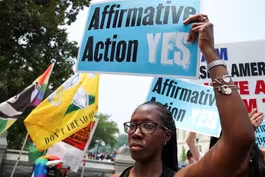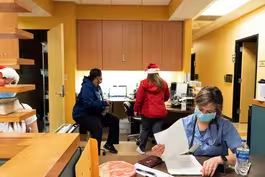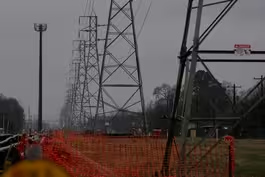
University president on diversity without affirmative action
Clip: 6/29/2023 | 4m 58sVideo has Closed Captions
Univ. of Michigan president on achieving diversity without affirmative action
The fallout of the Supreme Court’s affirmative action decisions will have major implications on colleges and universities across the country. One that knows the impact of ending race-based admissions all too well is the University of Michigan. University President Santa Ono discussed that with Amna Nawaz.
Problems playing video? | Closed Captioning Feedback
Problems playing video? | Closed Captioning Feedback
Major corporate funding for the PBS News Hour is provided by BDO, BNSF, Consumer Cellular, American Cruise Lines, and Raymond James. Funding for the PBS NewsHour Weekend is provided by...

University president on diversity without affirmative action
Clip: 6/29/2023 | 4m 58sVideo has Closed Captions
The fallout of the Supreme Court’s affirmative action decisions will have major implications on colleges and universities across the country. One that knows the impact of ending race-based admissions all too well is the University of Michigan. University President Santa Ono discussed that with Amna Nawaz.
Problems playing video? | Closed Captioning Feedback
How to Watch PBS News Hour
PBS News Hour is available to stream on pbs.org and the free PBS App, available on iPhone, Apple TV, Android TV, Android smartphones, Amazon Fire TV, Amazon Fire Tablet, Roku, Samsung Smart TV, and Vizio.
Providing Support for PBS.org
Learn Moreabout PBS online sponsorshipAMNA NAWAZ: The fallout of the court's decisions will have major implications on colleges and universities across the country.
But one university that knows the impact of ending race-based admissions all too well is the University of Michigan.
Joining me now to talk about all of this is University of Michigan President Santa Ono.
President Ono, welcome, and thanks for joining us.
Your university had scrapped your affirmative action plan years ago because of a Supreme Court decision earlier and a state ban.
So you haven't been taking race into account in admissions.
How is your institution impacted by today's ruling?
SANTA ONO, President, University of Michigan: Thank you very much.
That decision to ban on affirmative action here on race-conscious admissions happened in 2006.
It's about 17 years that we haven't been considering race in admissions.
We have been using multiple strategies, a holistic review, Pathways programs, and really looking for low-income, high-ability, and first-generation students to build a diverse class.
It has taken a lot of time.
We lost a lot of ground when affirmative action was banned.
But we're really making significant progress right now with those mechanisms.
AMNA NAWAZ: You have made progress in some areas.
But critics will say you did see a drop in Black undergraduate enrollment over those years.
As you mentioned, the university pivoted to focusing on recruiting low-income students, rather than looking at race, but that hasn't really worked, right?
Why is that failing?
And what do you do now?
SANTA ONO: Well, that's because that approach is not as efficient and direct as an instrument or a lever to accomplish diversity.
So you're absolutely right.
The critics are right.
And we did lose quite a bit of ground.
But we have learned a lot in the interim.
And then we want to share that with other institutions that are facing this today.
AMNA NAWAZ: So what can you share?
Another thing that people point out is that other institutions that cannot consider race, like UCLA and Berkeley, have managed to improve Black enrollment.
So what are they doing that you haven't done yet?
SANTA ONO: Well, actually, we have also started to increase Black and Latino and Native American enrollment recently.
We have tried a number of different approaches.
They have taken some time to stand up, and we'd like to share that with other institutions.
So we are seeing that progress.
And we'd love to -- we'd love to share what's been difficult along the way.
AMNA NAWAZ: Are you speaking with other university and college leaders who are concerned about the impact of today's ruling?
What kind of concerns do they have and what do you tell them?
SANTA ONO: Well, we speak on a regular basis.
We speak with the Department of Education, with the Biden administration.
And so we are talking about things that work things, that are challenging, to your point.
We are all, as a higher education sector, committed to a diverse student body and the benefits that it provides to the educational experience.
And so we're sharing that.
We're sharing that with the DOE.
And we're working together.
AMNA NAWAZ: So what does work?
Can you give us a concrete example in terms of one step universities can be taking if they cannot take into account race when looking at admissions?
SANTA ONO: There are a number of things that work, for example, the Pathways program, where you actually go into communities that are diverse, you work with the school systems and the students and the families and prepare them for application to the institution.
They are then more successful in the application process and they matriculate at higher numbers.
That is very successful.
The other is to use a holistic admissions approach, and to look less at numbers of AP examinations or classes and look less at standardized tests and look more in a holistic way at what the individual student has accomplished in their own milieu.
AMNA NAWAZ: What about legacy admissions?
We do know those tend to privilege white students.
Should we get rid of those to equal out the opportunities?
SANTA ONO: I really believe that is something that colleges and universities should look at.
We do not have legacy admissions here at the University of Michigan.
And we know that, in several colleges, a large proportion of admits our legacy or development admits.
And that is a kind of admissions process that does not support diversifying the student body.
AMNA NAWAZ: You and your fellow leaders at the University of Michigan have said you have remained convinced racial diversity is one of the many important components of a broadly diverse student body and a culturally rich campus community.
There are people who will hear that statement and say, I'm not sure that is true.
In light of today's ruling, tell me what you have seen over your career that says to you this is a value higher education institutions should continue to hold up.
SANTA ONO: I can tell you, whether you're a college, or a news agency, or Fortune 500 company, a diverse team that looks at things from different points of view is a stronger team.
And it's true for the educational system as well.
If you go into a classroom or laboratory, you see a diverse student body.
I can see the interaction that occurs, and they learn from each other.
AMNA NAWAZ: That is Santa Ono, president of the University of Michigan, joining us tonight.
President Ono, thank you for your time.
SANTA ONO: Thank you very much.
Breaking down the Supreme Court's affirmative action ruling
Video has Closed Captions
Clip: 6/29/2023 | 4m 47s | Breaking down the Supreme Court's ruling ending affirmative action in college admissions (4m 47s)
Cosmic discovery leads to greater understanding of universe
Video has Closed Captions
Clip: 6/29/2023 | 5m 41s | Gravitational wave discovery leads to greater understanding of the fabric of our universe (5m 41s)
Innovative clinic helps doctors avoid burnout
Video has Closed Captions
Clip: 6/29/2023 | 7m 32s | Innovative clinic helps doctors avoid burnout and makes healthcare more affordable (7m 32s)
Sesame Street helping Ukrainian children traumatized by war
Video has Closed Captions
Clip: 6/29/2023 | 9m 7s | How Sesame Street is helping Ukrainian children traumatized by war (9m 7s)
Texas power grid struggles with heat wave stresses
Video has Closed Captions
Clip: 6/29/2023 | 6m 43s | Texas power grid struggles with system-wide stresses caused by brutal heat wave (6m 43s)
Writer predicts diverse colleges without affirmative action
Video has Closed Captions
Clip: 6/29/2023 | 6m 31s | Writer predicts more socioeconomically diverse colleges after end of affirmative action (6m 31s)
Providing Support for PBS.org
Learn Moreabout PBS online sponsorship
- News and Public Affairs

FRONTLINE is investigative journalism that questions, explains and changes our world.

- News and Public Affairs

Amanpour and Company features conversations with leaders and decision makers.












Support for PBS provided by:
Major corporate funding for the PBS News Hour is provided by BDO, BNSF, Consumer Cellular, American Cruise Lines, and Raymond James. Funding for the PBS NewsHour Weekend is provided by...





